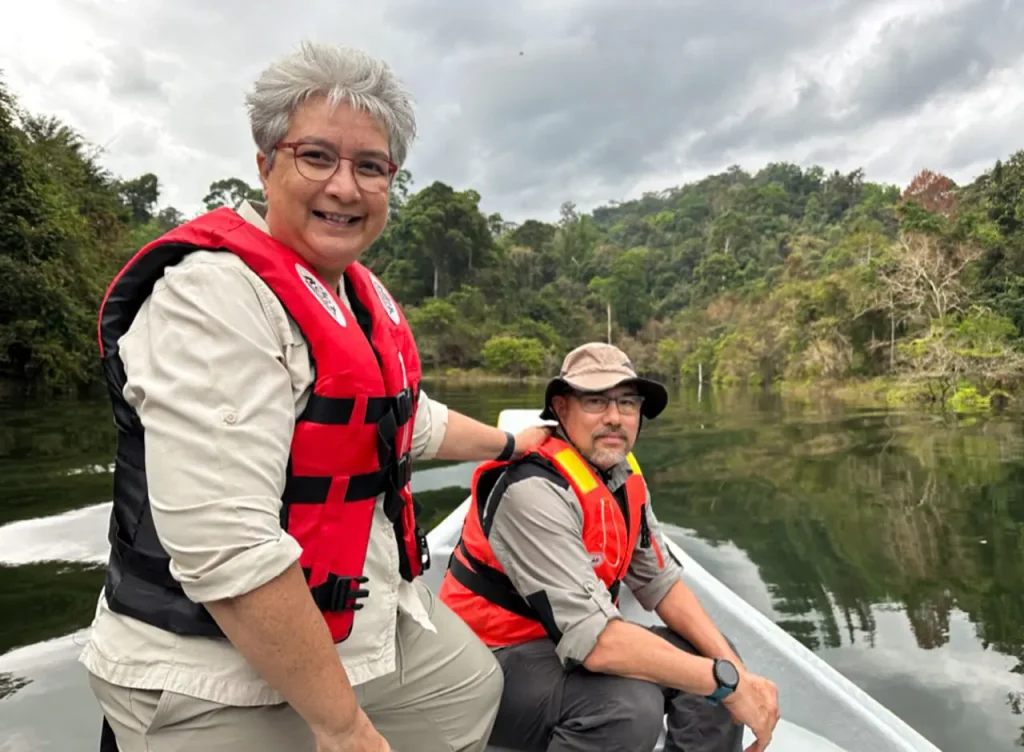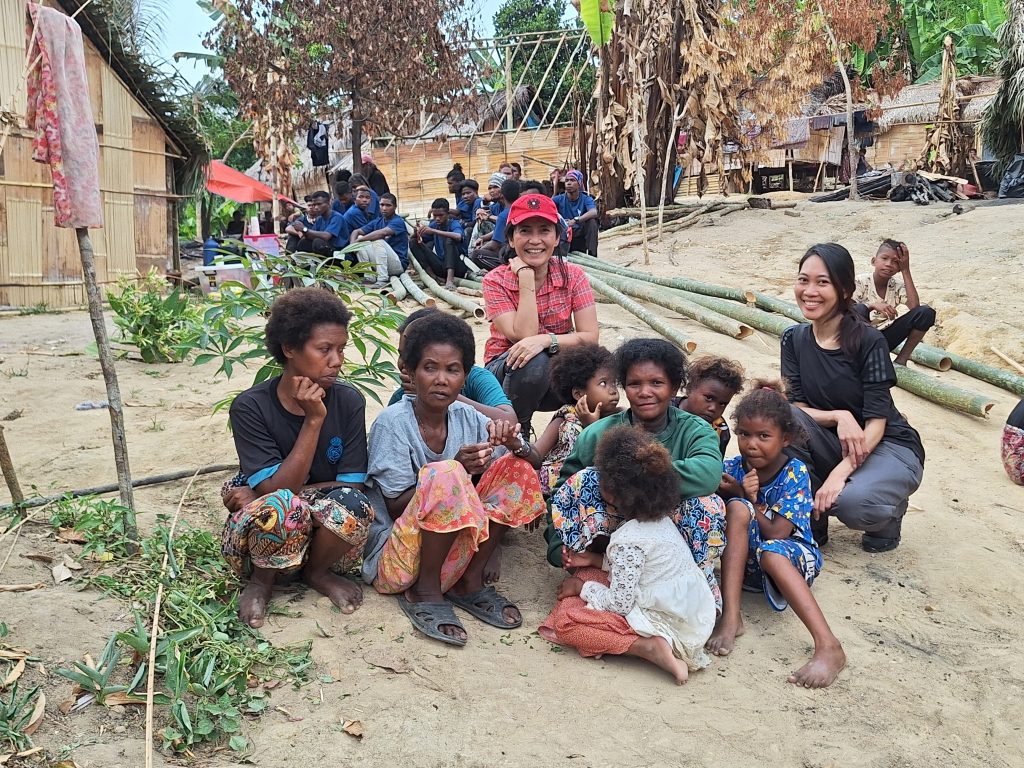Deep in the heart of Royal Belum State Park, where ancient trees whisper stories and tiger tracks mark the forest floor, a quiet revolution in education is unfolding.
This UNESCO-listed rainforest, one of the world’s oldest, is home to endangered species like the Malayan tiger and Asian elephant, as well as the Jahai communities of the Orang Asli, Malaysia’s Indigenous peoples. For generations, they’ve lived in symbiotic harmony with the land. But in villages like Kampung Tanhain, Jerai, and Sungai Kejar, formal education has long remained out of reach, geographically distant and culturally disconnected.
Here, Rumah Baca (Reading Houses) or as the Jahai say, Pei Bak Rumah Baca (“Let’s go to school!”), are doing far more than teaching literacy. They are bridging worlds: unlocking self-expression and opportunity while raising a generation of Indigenous children to see themselves not as outsiders to conservation, but as its rightful guardians and future leaders.
A Collaboration Rooted In Community
This is no ordinary initiative. Rumah Baca is the result of a rare, community-driven partnership between ALAM, a national movement championing environmental education and grassroots change; the Perak State Parks Corporation (PSPC), the official guardians of Royal Belum; and RIMAU, a conservation NGO dedicated to protecting Malayan tigers and Indigenous livelihoods.
What binds them is a shared belief: true conservation starts with people, and education is the most powerful tool for long-term ecological resilience, cultural preservation, and sustainable development.
A Seed Planted In Tragedy, Nurtured By Hope

Rumah Baca didn’t emerge from policy – it grew from pain.
In 2015, the nation reeled from the SK Pos Tohoi tragedy, where seven Orang Asli children fled their hostel and vanished into the jungle. Only two survived after 47 harrowing days. The tragedy exposed deep systemic failures in protecting and educating Indigenous children—a wake-up call for change.
In Royal Belum, schools remained hours away by boat, and cultural barriers persisted. But the Menraq patrol unit, indigenous forest guardians trained by RIMAU, understood a vital truth: protecting the forest meant empowering the next generation.
Their plea was simple: “Can our children have the chance to learn?”
The answer was Rumah Baca: a network of community-led learning spaces, co-created by ALAM, PSPC and RIMAU with the Orang Asli through Free, Prior, and Informed Consent (FPIC), and supported by partners like Majlis Agama Islam dan Adat Melayu Perak (MAIPK) and the European Union.
The Ripple Effect: From Literacy To Leadership
The impact has been transformational and generational. Children like Pooja, once too shy to speak, now attend formal school in Kampung Bongor, her confidence blooming.
In truth, the roots of Rumah Baca lie not in boardrooms but in the aspirations of the community.
We have witnessed remarkable transformations in the children’s behaviour and confidence. Many have developed a sense of curiosity, enhanced communication skills, and a greater eagerness to engage in structured learning environments. We believe this dream was ignited by the role models they encountered through our initiative. – Nor Aishah binti Abu Hassan, Administrative Officer (Community), PSPC

The initiative’s impact also uplifts Orang Asli women, many of whom are now trained educators.
The leadership exhibited by Orang Asli women in Rumah Baca has been nothing short of transformative. Their active participation bridges cultural divides and fosters a nurturing learning atmosphere rooted in trust and mutual respect. As a result, we have seen increases in school attendance, stronger parental support, and a burgeoning sense of pride among the children, particularly the girls. – Dato’ Shah Redza Hussein, CEO of Malaysia Forest Fund

That spirit of ownership is spreading. Khairul, a dedicated Menraq patroller, now spends his day off teaching children at the Rumah Baca in Tanhain. He also attends literacy classes organised by RIMAU for patrollers like himself.
His commitment signifies a profound dedication to education and the development of his community. His actions embody our vision, cultivating a culture of knowledge-sharing and community-led learning initiatives within Royal Belum. – Lara Ariffin, President of RIMAU
Khairul’s story signals a powerful shift—education is no longer an outside imposition, but a homegrown movement.
By choosing to nurture young minds during his personal time, he sets a powerful example of self-motivated learning and mentorship, encouraging fellow Menraq members to actively participate in educational initiatives and strengthen community connections. – Harun Rahman, Programme Lead, RIMAU

The outcomes speak for themselves. Children aren’t just learning to read and write—they’re taking the next step. With access to basic preschool education, five older children have recently enrolled in a government school in Kampung Bongor.
These milestones reflect a growing enthusiasm for learning and a renewed willingness among families to pursue formal education for their children.
Education As An Environmental Strategy

For the Orang Asli, education is deeply intertwined with the land, serving as a tool for protection, participation, and leadership. In Royal Belum, where the forest serves as both a lifeline and a legacy, education is becoming as vital as food or shelter in the fight to conserve it.
Among the Menraq patrollers trained by RIMAU, none had SPM qualifications, and only a few could read, write, or count. Today, they confidently operate GPS units, satellite phones, and patrol cameras to safeguard their ancestral home.
WWF-Malaysia commends the initiative by ALAM, PSPC and RIMAU. Through the training, we have witnessed remarkable growth in their confidence and their ability to engage in open discussions and active participation. When paired with their rich traditional knowledge, education fosters a more holistic and strategic approach to conservation. It empowers them not only to protect their ancestral forest but also to manage it sustainably for future generations. – Dr. Henry Chan, Senior Director of Conservation, WWF-Malaysia
Education enables the Orang Asli to lead conservation on their own terms, rooted in culture, bolstered by knowledge, and aligned with national goals for sustainability.

From the perspective of the state park authority, the benefits go beyond personal empowerment. Rumah Baca is more than a reading house, it is a gateway to opportunity and inclusion.
By opening the door to formal education, community members become better qualified for employment and are able to take on more significant roles in forest management. – Lau Ching Fong, Acting Director of PSPC
What It Takes To Grow

For Rumah Baca to thrive beyond Royal Belum, it needs more than passion. Scaling this model of community-led education and conservation requires a deeper, long-term commitment—one that redefines the role of corporations and moves beyond token gestures.
To effectively replicate successful initiatives like ALAM’s Rumah Baca, corporations must transcend traditional CSR approaches, which often prioritise compliance and fleeting goodwill. We need to embrace a philanthropic mindset that emphasises long-term systemic change, adopting a comprehensive society-wide approach. – Wan Faizah Che Din, Chief Executive Officer of ALAM

This is not just about building classrooms or providing supplies. It’s about investing in people. True change happens when communities are empowered to shape their own futures. That means sustained support for local leadership, knowledge, and opportunity.
Empowering Indigenous and local communities means recognising them as active partners rather than mere beneficiaries. This includes supporting capacity-building for Indigenous women, creating alternative livelihoods, and co-designing educational and conservation programs with grassroots knowledge at the forefront. – Prof. Emeritus Tan Sri Dr. Zakri Abdul Hamid, Board of Trustees, ALAM

Rumah Baca exemplifies what’s possible when conservation is reimagined through the lens of community, education, and equity. It is not a top-down project but a grassroots movement grounded in trust, tradition, and shared responsibility for the forest.
As more children dream in classrooms built by their own communities and as dedicated patrollers like Khairul step into roles as mentors and teachers, something profound is unfolding. Take Teacher Rita, for example. Once illiterate, she now reads, writes, and teaches, becoming a beacon for the next generation.
The forest isn’t just being protected – it’s being loved, understood, and passed on.
When you teach a child to read, you give them a voice. And when that voice speaks for the forest, the world listens.
In the hands of young learners, former patrollers, and first-time teachers, Royal Belum’s future is being written – one word, one step, one life at a time.


